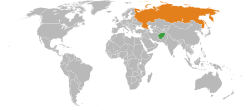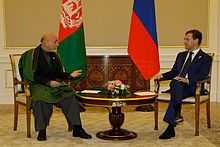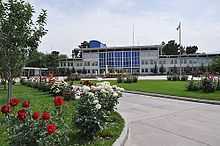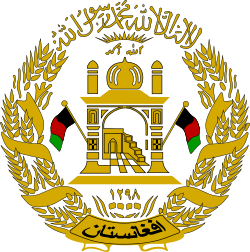Afghanistan–Russia relations
 |
|
Afghanistan |
Russia |
|---|---|
Afghanistan–Russia relations (Russian: Российско-афганские отношения) refers to the relations between the nations of Afghanistan and Russia. Relations were contentious when Soviet Russia invaded Afghanistan in 1979, precipitating a negative reaction in much of the Muslim world and creating a chain of events which would bring Afghanistan in the futureless and disastrous situation Afghanistan finds itself ever since. However, Russo-Afghan relations have somewhat improved in the years following the conflict, and Russia now has an embassy in Kabul and a consulate-general in Mazar-e-Sharif, and Afghanistan has an embassy in Moscow.
Historical relations
In the nineteenth century, Afghanistan served as a strategic buffer state between Czarist Russian and the British Empire in the subcontinent during the so-called Great Game. Afghanistan's relations with Moscow became more cordial after the Bolshevik Revolution in 1917. The Soviet Union was the first country to establish diplomatic relations with Afghanistan in 1919[1] after the Third Anglo-Afghan war and signed an Afghan-Soviet nonaggression pact in 1921, which also provided for Afghan transit rights through the Soviet Union. Early Soviet assistance included financial aid, aircraft and attendant technical personnel, and telegraph operators.

The Soviets began a major economic assistance program in Afghanistan in the 1950s. Between 1954 and 1978, Afghanistan received more than $1 billion in Soviet aid, including substantial military assistance. In 1973, the two countries announced a $200-million assistance agreement on gas and oil development, trade, transport, irrigation, and factory construction. Following the 1979 invasion, the Soviets augmented their large aid commitments to shore up the Afghan economy and rebuild the Afghan military. They provided the Karmal regime an unprecedented $800 million. The Soviet Union supported the Najibullah regime even after the withdrawal of Soviet troops in February 1989. Today, unresolved questions concerning Soviet MIA/POWs in Afghanistan remain an issue between Russia and Afghanistan.
In 1993, Tajik rebels based in Afghanistan attacked a Russian border outpost in Tajikistan, killing 25 Russians and prompting Russian retaliatory strikes, which caused extensive damage in northern Afghanistan. Reports of Afghan support for the Tajik rebels led to cool relations between the two countries.
Russia became increasingly disenchanted with the Taliban over their support for Chechen rebels and for providing a sanctuary for terrorist groups active in Central Asia and in Russia itself. Russia provided military assistance to the Northern Alliance, who eventually proved a major force in the efforts to overthrow the Taliban regime following US intervention in 2001.
In October 2005, Russian defense officials stated they will be giving helicopters and other military equipment to Afghanistan's army worth $30 million USD.[2]
In October 2010, the Afghan President Hamid Karzai reprimanded Russia after its forces entered the country without permission. He also stated that Russia has "violated Afghan sovereignty" in a joint mission with United States agents.[3]
References
| Wikimedia Commons has media related to Afghanistan - Russia relations. |
- ↑ Amin Saikal, Ravan Farhadi, Kirill Nourzhanov. Modern Afghanistan: a history of struggle and survival. I.B.Tauris, 2006. ISBN 1-84511-316-0, ISBN 978-1-84511-316-2. Pg 64
- ↑ "Tourists flee devastated flood area". Chicago Tribune. 10 October 2005. Retrieved 27 December 2014.
Russia will supply Afghanistan's fledgling army with helicopters and equipment worth $30 million
- ↑ Los Angeles Times - Karzai denounces drug raid in Afghanistan
| ||||||||||||||||||||



